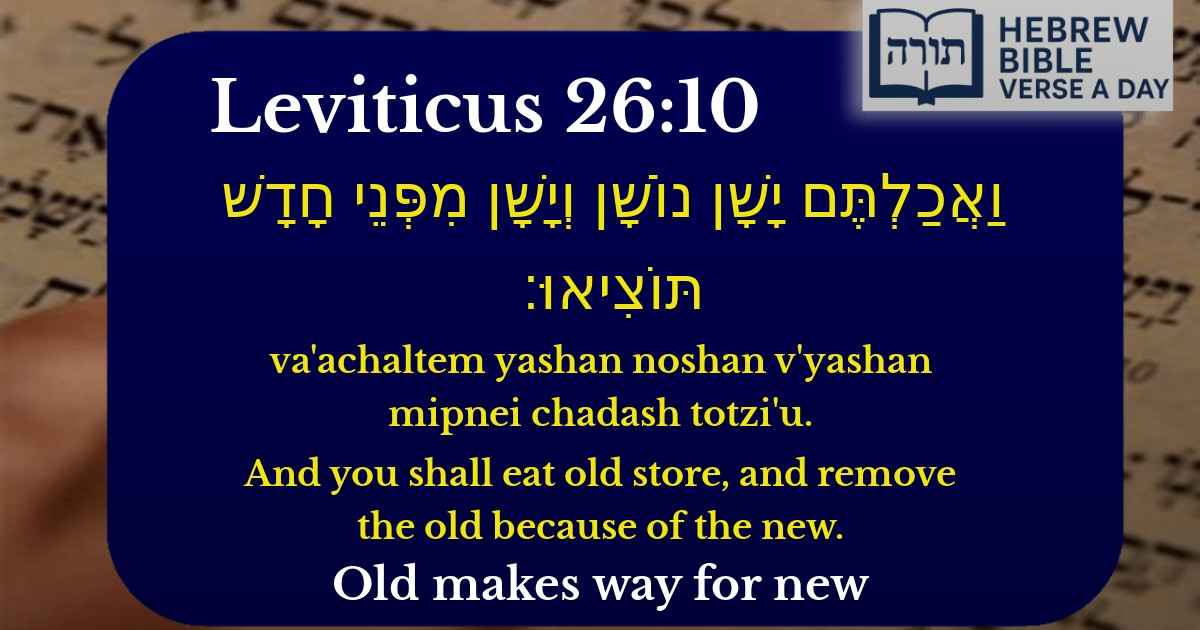Join Our Newsletter To Be Informed When New Videos Are Posted
Join the thousands of fellow Studends who rely on our videos to learn how to read the bible in Hebrew for free!
Hebrew Text
וַאֲכַלְתֶּם יָשָׁן נוֹשָׁן וְיָשָׁן מִפְּנֵי חָדָשׁ תּוֹצִיאוּ׃
English Translation
And you shall eat old store, and remove the old because of the new.
Transliteration
Va'achaltem yashan noshan v'yashan mipnei chadash totzi'u.
Hebrew Leining Text
וַאֲכַלְתֶּ֥ם יָשָׁ֖ן נוֹשָׁ֑ן וְיָשָׁ֕ן מִפְּנֵ֥י חָדָ֖שׁ תּוֹצִֽיאוּ׃
וַאֲכַלְתֶּ֥ם יָשָׁ֖ן נוֹשָׁ֑ן וְיָשָׁ֕ן מִפְּנֵ֥י חָדָ֖שׁ תּוֹצִֽיאוּ׃
🎵 Listen to leining
Parasha Commentary
📚 Talmud Citations
This verse is quoted in the Talmud.
The verse is discussed in the context of the laws regarding the storage and consumption of old and new produce, particularly in relation to the offerings in the Temple.


Context of the Verse
The verse (Vayikra 26:10) appears in the section of the Torah detailing the blessings that will come to Bnei Yisrael if they follow Hashem's commandments. This particular verse speaks about agricultural abundance, where the old produce will remain plentiful until the new harvest arrives, necessitating the removal of the old to make room for the new.
Rashi's Explanation
Rashi explains that the phrase "וְיָשָׁן מִפְּנֵי חָדָשׁ תּוֹצִיאוּ" ("and remove the old because of the new") means that the old grain will still be in storage when the new grain arrives, requiring the removal of the old to accommodate the new. This signifies an extraordinary blessing of abundance, as typically, the old grain would have been consumed before the new harvest.
Rambam's Perspective
Rambam (Hilchot Shemitah v'Yovel 13:5) connects this verse to the broader theme of divine reward for mitzvah observance. He emphasizes that material blessings, such as agricultural plenty, are contingent upon adherence to Torah and mitzvot. The overflowing storage symbolizes Hashem's direct providence over those who fulfill His will.
Midrashic Interpretation
The Midrash (Torat Kohanim 26:10) elaborates that this blessing reflects a state of peace and stability, where there is no fear of famine or scarcity. The removal of old grain is not out of necessity but due to the overwhelming abundance of the new harvest—a sign of divine favor.
Practical Halachic Implications
Symbolic Meaning
Some commentators, such as the Kli Yakar, suggest that the "old" and "new" also allude to spiritual renewal. Just as one must make space for new physical sustenance, one must also "remove" outdated habits or complacency to embrace renewed spiritual growth in avodat Hashem.